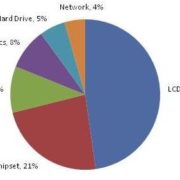The beginning of the New Year often marks an avalanche of stories enthusing about the “next big thing.” Usually, a glorious, completely transformed future is predicted due to the disruptive qualities of a new technology.
This article will be the first of a series in which I’ll try to let the steam out of a few commonly hyped trends. To be clear, each of these technical innovations represents genuine change in the way we approach mobile computing. I just think there are going to be bumps in the road.
Nothing has been more hyped than cloud computing. Seen as a way of avoiding hardware costs, as well as a way of minimizing software licensing fees, the cloud has become a favorite C-suite buzzword. There has been a prevailing assumption that it is not only desirable, but also inevitable that all enterprise applications will someday be fully cloud-based.
“The worldwide market for public cloud services across all segments grew 20.8% to $91.4 billion in 2011, up from $75.6 billion in 2010 …”Network world
I don’t think that 2013 will be the year that cloud computing will fade. Indeed, I expect it to continue to spread. However, I do think there is a very real possibility that this may be the year in which executives and IT folk will stop talking about it as if it were a combination of cheap cold fusion and good-tasting, zero-calorie, chocolate cake.
Let us count the ways that the cloud has a touch of grey:
- Spectrum management– In addition to cloud computing, we can expect autonomous cars, and the “internet of things” to make already sparse bandwidth even scarcer (see Interoperability: “ Bandwidth is more precious than gold and platinum”). Talk to anyone who has come back from combat theater in Afghanistan or Iraq, and you were hear tales of IEDs jammers interfering with communications and air traffic control chatter disrupting the control of nearby Unmanned Ground Vehicles. Stateside, LightSquared lost a $3 billion investment, when the FCC ruled its wireless broadband network interfered with GPS. Will there be enough bandwidth for cloud computing and all the other predicted wireless applications? Is anyone even looking at this problem? If you still think this is not an issue, try to remember the last time that you saw an unlimited data plan.
- Hardware is better-One of the original justifications for cloud computing was hardware costs. Installing new software has been a traditionally tricky process, since it often placed demands on older platforms that they could not meet. The problem with this a problem is that it may no longer be a problem. Computers, including mobile platforms, have significantly improved their processing speeds and other capabilities. Upgrading a new computer to support a new program is no longer as frequent an event as it has been. Furthermore, the programs that are resource heavy, such as CAD, that may necessitate hardware upgrades, are almost impossible to use on the cloud.
- Bandwidth is not only limited, it is not free – Let’s say that you are running a payroll application or a data-heavy research program. Does it make sense to send each and every number to the cloud and back? Even if the expense for the cost of the bandwidth of each number is negligible, the aggregate expenditure over time could be considerable. Even if the cost isn’t that big deal, managing large data sets over a wireless interface could become an exercise in inefficiency. Just because some applications should be cloud based, doesn’t mean all of them should be.
- No control over expense – By definition, a business that is cloud based is dependent on outsiders. At first, renting the software license on a monthly basis may be cheaper than buying it outright. However, the business loses control over the expense, i.e. the service provider can raise their prices anytime the agreement runs out. This situation worsens the more an enterprise is dependent on the cloud.
- No control over data – Suppose, your business decides to get rid of Outlook and use entirely a web-based service such as Gmail. Now let’s further imagine a malicious entity breaking into any one of the business’s employee’s accounts, and using it to spam all their contacts. Someone complains, and Google suspends your Gmail account.
For each of the problems that I raised above, there are solutions. Private wireless networks can be built. Gmail accounts can be backed up. However, each of these solutions takes time and efforts. As more people gain experience with moving applications to the cloud, and discovering its drawbacks, the ROI of doing so may look less attractive.
Of course, some applications will be cloud based, and I expect their number to increase. I just think that the forecast of cloud-based enterprise applications destroying the need for local servers may be as accurate as the prediction that computers will create a paperless office.







